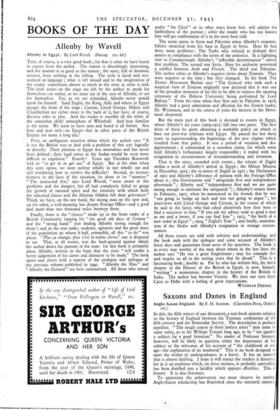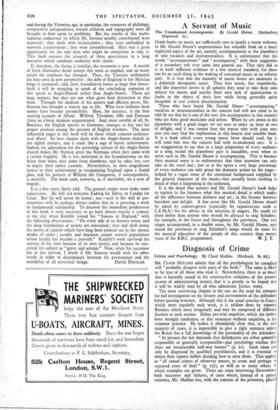Saxons and Danes in England
IN this, the fifth winter of our discontent, a text-book appears relating to the history of England between the Teutonic settlements of the fifth century and the Domesday Survey. The description is perhaps repellent. "The rough course of those lawless times" may seem to some today, as to Sir William. Temple long ago, to be " too ignoble a subject for a good historian." No reader of Professor Stenton, however, will be likely to question either the importance of his subject or the relevance of his account of " the childhood of our age—the explanation of its manhood." This is no book designed to meet the wishes of undergraduates in a hurry. It has an interest that is almost thrilling. I hope it will attract the readers it deserves, for in it an erudition which, on these matters, is probably unrivalled, has been distilled into a lucidity which appears effortless. This is history. It is also literature. To appreciate the achievement one must observe its setting. Anglo-Saxon scholarship has flourished since the sixteenth century,
and during the Victorian age, in particular, the resources of philology, comparative jurisprudence, textual criticism and topography were all brought to bear upon its problems. But the results of this multi- tudinous endeavour (to which Mr. Stenton notably contributed) were scattered ; they dealt with technicalities; were embedded in outworn controversies ; they were unsyntesised. Here was a great opportunity for the rare man who might be competent to take it. This book assesses the research of three generations in a long narrative which combines authority with charm.
If, therefore, the theme is familiar, the treatment is new. A wealth of fresh illustrative detail stamps this work as original, and on many points the emphasis has changed. Thus, the Teutonic settlements are here seen in new perspective ; the debt of England to her Mercian kings is increased ; and, later, Scandinavia looms so large that hence- forth it will be tempting to speak of the concluding centuries of this epoch as Anglo-Danish rather than Anglo-Saxon. These are large matters, but they are not what gives final distinction to this book. Through the medium of his austere and efficient prose, Mr. Stenton has brought a remote age to life. What have hitherto been names have become personalities. Here, for instance, is the best existing account of Alfred. Wilfred, Theodore, Offa and Dunstan claim an almost intimate acquaintance. And,.most notable of all, St. Boniface, the English apostle to Germany, emerges at last into his proper position among the greatest of English worthies. The most influential pages in this book will be those which concern ecclesias- tical affairs. Its best chapter deals with the Anglo-Saxon church in the eighth century, and it reads like a saga of heroic achievement. Indeed, his admiration for the persisting culture of the Anglo-Saxon church makes Mr. Stenton greet the Normans when they come with a certain frigidity. He is less interested in the Scandinavians on the Seine than when they come from elsewhere, and he takes less care to depict their native customs. Nevertheless, he does magnificent justice to their achievement in reorganising England upon a feudal plan, and his portrait of William the Conqueror, if unsympathetic, is masterly. The book ends, however, as if inevitably, on a note d tragedy.
It is a fine story, finely told. The general reader must Make some concessions. He will not welcome Eadwig for Edwy, or Ceadda for Chad. But he will never be bored ; nor—such is the skill of pre- sentation—will he perhaps always realise that he is perusing a work of fundamental scholarship. To discover the immediate predecessor 'of this book, it were necessary to go back almost exactly a century to the day when Kemble issued his -" Saxons in England," with the following observations: " On every side of us thrones totter, and the deep foundations of society are convulsed ; shot and shell sweep the streets of capitals which have long been pointed out as the chosen 'hocks of order ; cavalry and bayonets cannot control populations whose loyalty has become a proverb." Kemble's work survived the stresses of his time because of its own merits, and because he con- ceived his subject as "grave and solemn." Now, when his successor has at last arrived, I doubt if Mr. Stenton would wish for other words in order to discriminate between the permanence and the
mutability of all terrestrial things. DAVID DOUGLAS.































 Previous page
Previous page